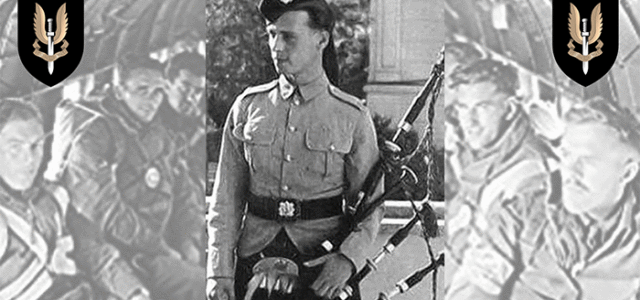
In his new book, author Damien Lewis recounts the exploits of the SAS and David ‘The Mad Piper’ Kirkpatrick and his role in Operation Tombola in northern Italy during WW2, an operation which saw him parachute behind enemy lines wearing his regimental kilt……..
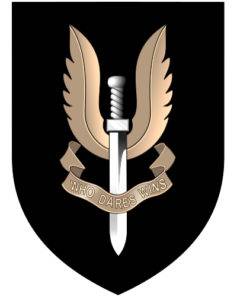 ‘Legendary SAS commander Major Roy Farran had put in a special request for what he saw as his secret weapon – a youthful Scottish piper in the shape of one David Kirkpatrick.
‘Legendary SAS commander Major Roy Farran had put in a special request for what he saw as his secret weapon – a youthful Scottish piper in the shape of one David Kirkpatrick.
What does a Special Forces unit that is meant to operate in secret (quietly) behind enemy lines need with a (very loud) bagpiper?
Surely this was anathema, running contrary to the very essence of silent, stealthy forces striking by utter surprise? But no, Farran’s was actually an inspired and wily plan.
Working behind enemy lines, especially in concert with local partisan groups, could lead to reprisals from the local German troops. They tended to take out their anger on the local civilian populace, as a way to ‘dissuade’ further action by the resistance.
Farran knew this from experience of previous behind-the-lines missions. In German – controlled northern Italy in March 1945, his 40 SAS would be operating alongside 100 war-bitten Italian partisans.
Farran was determined to stamp an indelibly ‘British’ mark on his operations to deter any reprisals. The Germans had every reason to fear the Italian partisans.
[wds id=”2″]
Over the winter of 1944 – 45, the Italian resistance had accounted for some 20,000 dead and injured German troops. In response, Field Marshal Albert Kesselring – a Hitler favourite and his supreme commander in Italy – ordered his men to resort to widespread brutality.
‘It is the duty of all troops and police in my command to adopt the severest measures, Kesselring had announced. ‘Every act of violence committed by the partisans must be punished immediately.’
He ordered ‘a proportion of the male population’ to be shot, while pledging to ‘protect any commander who exceeds the usual restraints’. Hitler added fuel to the fire, ordering 10 partisans killed for every German casualty.
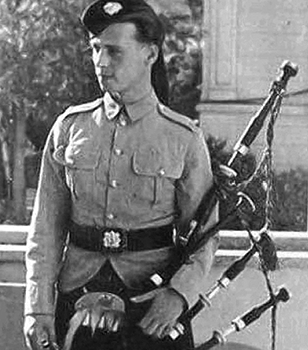
Farran, aware of the increasing savagery adopted by the enemy, was determined to avoid anything similar in his area of operations. One way he could try to convince the enemy that his was a wholly British operation was to include a Scottish regimental piper in his raiding force.
Something of a wild and troubled teen, David ‘The Mad Piper’ Kirkpatrick had earned a reputation for drinking and insubordination, but he was utterly reliable when leading troops in action.
Having already piped ashore a Commando unit on a do – or – die daylight raid in Albania, his commander sought him out for a new, and even more daring operation. Kirkpatrick was working in the dreaded ‘stores’ at the time, where a slow death through boredom often resulted.
He was ripe to be recruited to Farran’s cause. ‘I’m looking for a piper to do a wee job,’ his commander announced, enigmatically. ‘I know you’re more or less qualified for these things.’
‘Aye’, Kirkpatrick had agreed, simply, ‘I’m way fed up in the stores.’
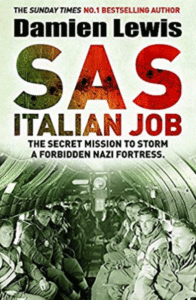
Thus he was recruited for Major Roy Farran’s mission, codenamed Tombola. That ‘wee job’ entailed boarding an aircraft, being strapped to a parachute and jumping into northern Italy some 200 miles behind the lines. It was very possibly a safer place for the young Kirkpatrick than back in Scotland, for when his father found out his son had volunteered for Special Service he was none too happy.
On the night of 23/24 March 1945, Kirkpatrick made his drop. Forty SAS were already on the ground having jumped earlier in the month. The main difference between him and them was that none of them had parachuted from an aircraft wearing a regimental kilt.
A sight not seen in Italy’s Apennine Mountains, it caused quite a stir amongst the locals, who seemed to think a woman in a skirt was falling from the skies.
Once on the ground, Farran explained to Kirkpatrick the nature of his role in the forthcoming raid. Even as all hell was to let loose during the planned attack on the German 14th Army headquarters – one that controlled 100,000 troops garrisoning northern Italy – Kirkpatrick was to begin piping Highland Laddie, then the formal marching song [sic] of all British Highland regiments.
The aim was to stamp an iconic British signature on the battle, to deter against reprisals. Farran also sought to stiffen the resolve of those charged to fight their way into the headquarters buildings – two fortress-like villas – intent on wreaking bloody mayhem.
On the night of the attack that is exactly what Kirkpatrick did. The Germans were taken by complete surprise, as bullets ricocheted about the place and grenades went off, the raiders striking from out of the silent darkness.
They were further shocked and confused to hear, intermingled with the cacophony of battle, the sound of a lone piper playing Highland Laddie. It sounded as if an entire British Army regiment had arrived on their doorstep.
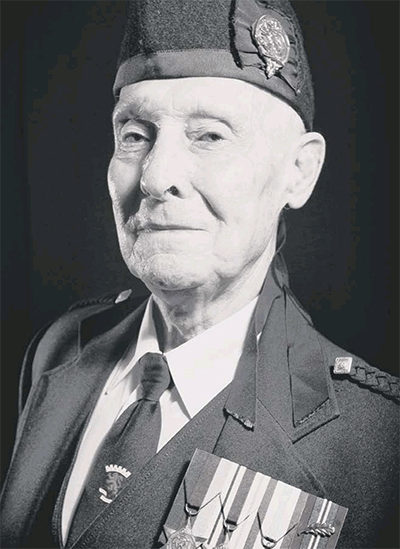
What Farran had hoped for seemed to be paying off. ‘Keep playing,’ he cried above the roar of battle. ‘You’re my secret weapon!’
And play Kirkpatrick did, ignoring the bullets that targeted his pipes, blasting holes in the uppermost section of the bass drone, the longest pipe that creates the harmonising bass tone [sic].
The long and gruelling retreat to their mountain base would take 24 exhausting hours, but as the raiders approached safe territory, delirious with fatigue, they dug deep and fell into line. Their attitude and posture were stiffened as the sound of Kirkpatrick’ s bagpipes rang out, and the men marched into the village heads held high.
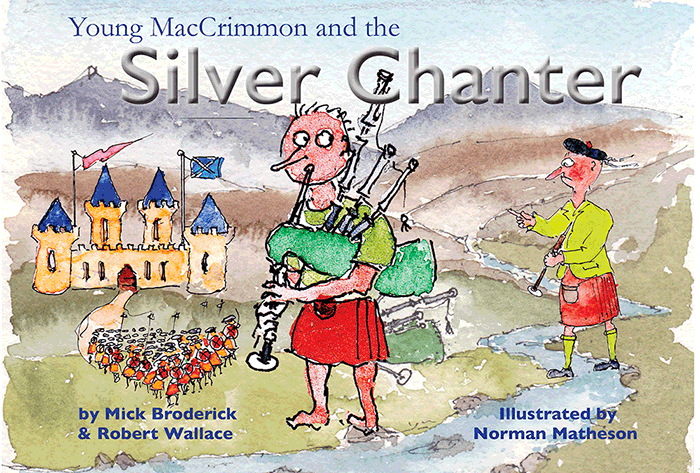
Farran’s plan had worked. Sixty enemy officers were killed and the headquarter villas left gutted, smoking ruins. The attack was hailed as, ‘One of the most dangerous and effective ever undertaken by this Regiment against the enemy,’ by SAS Lt Col Robert Walker-Brown, MBE DSO.
Even though there was evidence of partisan involvement, the enraged enemy decided against carrying out reprisals for it was so clearly a British-led raid. Once again a lone piper had led his men into battle, armed only with his instrument and his resolve to keep playing under fire.
After the war, David Kirkpatrick returned to Scotland and settled into family life. It wasn’t until a few years before his death in 2016 that he would find out that the Italian village where the raid had taken place had for years celebrated his actions as those of a true war hero.
David would be invited with his family to join the villagers, taking his pipes with him so as to play once again on the battlefield. After his death his sons, all pipers themselves, have returned there to carry on the tradition and to pay homage to the brave actions of their father, and all who served on that raid.
• You can read more about this audacious raid and the exploits of David ‘The Mad Piper’ Kirkpatrick in my new book ‘SAS Italian Job’. Order the book here.
[wds id=”8″]















Being a history buff I have dead a few of Damian Lweis’s books and have never been disappointed with his narrative writing style. He takes historic facts and makes them read like a great novel, can’t wait to read this one